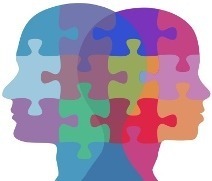Time to revamp psychiatry and mental health in light of modern neuroscience?
 Transforming Diagnosis (article by Thomas Insel, Director of the NIMH): “In a few weeks, the American Psychiatric Association will release its new edition of the Diagnostic and Statistical Manual of Mental Disorders (DSM‑5)…While DSM has been described as a “Bible” for the field, it is, at best, a dictionary, creating a set of labels and defining each. The strength of each of the editions of DSM has been “reliability” – each edition has ensured that clinicians use the same terms in the same ways. The weakness is its lack of validity. Unlike our definitions of ischemic heart disease, lymphoma, or AIDS, the DSM diagnoses are based on a consensus about clusters of clinical symptoms, not any objective laboratory measure. In the rest of medicine, this would be equivalent to creating diagnostic systems based on the nature of chest pain or the quality of fever. Indeed, symptom-based diagnosis, once common in other areas of medicine, has been largely replaced in the past half century as we have understood that symptoms alone rarely indicate the best choice of treatment.
Transforming Diagnosis (article by Thomas Insel, Director of the NIMH): “In a few weeks, the American Psychiatric Association will release its new edition of the Diagnostic and Statistical Manual of Mental Disorders (DSM‑5)…While DSM has been described as a “Bible” for the field, it is, at best, a dictionary, creating a set of labels and defining each. The strength of each of the editions of DSM has been “reliability” – each edition has ensured that clinicians use the same terms in the same ways. The weakness is its lack of validity. Unlike our definitions of ischemic heart disease, lymphoma, or AIDS, the DSM diagnoses are based on a consensus about clusters of clinical symptoms, not any objective laboratory measure. In the rest of medicine, this would be equivalent to creating diagnostic systems based on the nature of chest pain or the quality of fever. Indeed, symptom-based diagnosis, once common in other areas of medicine, has been largely replaced in the past half century as we have understood that symptoms alone rarely indicate the best choice of treatment.
Patients with mental disorders deserve better. NIMH has launched the Research Domain Criteria (RDoC) project to transform diagnosis by incorporating genetics, imaging, cognitive science, and other levels of information to lay the foundation for a new classification system…”
No One Is Abandoning the DSM, but It Is Almost Time to Transform It (SciAm blog post): “Let me be clear: mental illness is real, but the discrete categories of illness in the DSM might not exist outside its pages…NIMH has, however, been working on an endeavor known as the Research Domain Criteria Project, or RDoC for short, which encourages psychologists, neuroscientists and other scientists to think outside the DSM box—to begin transitioning away from established DSM disorders and instead study fundamental biological and cognitive processes underlying mental illness. The important distinction here is between clinical practice and research. The NIMH is not in any way saying that clinicians should stop using the DSM, but it does think that the DSM has constrained research…
Insel echoed these comments in a separate e‑mail: “We cannot ‘ditch’ or ‘reject’ terms like schizophrenia or bipolar. We just need to view them as constructs, perhaps including many different disorders that require different treatments or obscuring disorders than cut across the current categories. A symptom-only system will not be sufficient for identifying brain disorders—whether the initial label is dementia or schizophrenia…”
Related articles:
- The State of Personalized Medicine: The Role of Biomarkers
- Personalized Medicine in Psychiatry: from DSM to brain-based RDoC, iSPOT‑D and biomarkers
- Working with Healthcare Stakeholders towards Brain-Based Personalized Medicine
Pic courtesy of BigStockPhoto


